Lower Yanoun, West Bank 9 November 2004
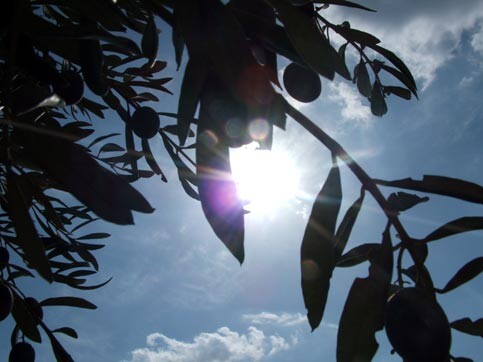
Blue sky and puffy clouds make for good olive picking weather
Saturday was perfect olive picking weather for the uninitiated - not too hot, with puffy white clouds passing through the blue sky to protect us from the sun. My friend Bina and I took a “service” taxi from Ramallah to Lower Yanoun, a village near Nablus, where we met several other internationals representing countires as disparate as England, Israel, Norway, France, Morocco, and Lebanon. We were all there to help the Yanoun farmers with their olive harvest.
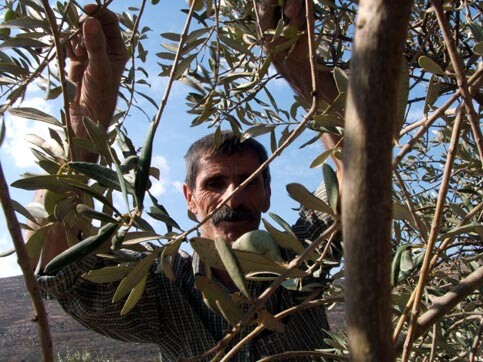
One of the Palestinian farmers demonstrates how olive picking is done
What is an ancient practice that holds great spiritual and economic significance to Palestinians is threatened by Israel’s colonization of West Bank lands. In areas such as the village of Jayyous, farmers have been cut off from their olive orchards by the apartheid wall Israel is illegally building with the intention of annexing precious natural resources to the Israeli side while preventing the rightful Palestinian owners access to their land. But here in Yanoun, it is the Israeli settlers themselves who harass and shoot at the Palestinian harvesters, whose only crime is their desire to work the land that their ancestors have tended for generations.
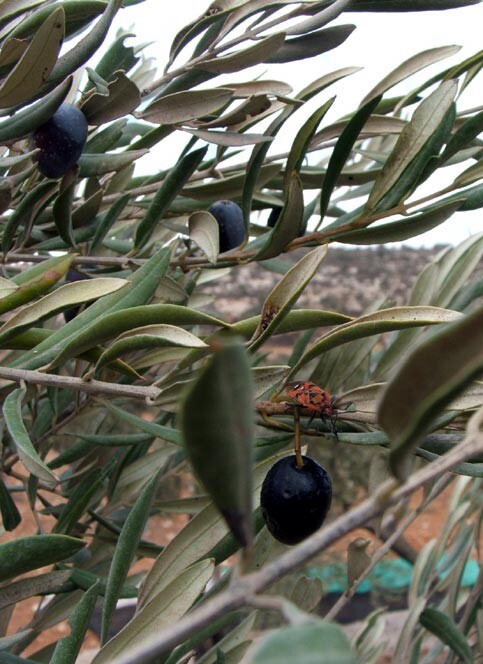
A red insect climbs along a twig of an olive tree
The landscape of Yanoun is idyllic. Rolling hills of rocks and trees seem as though they have been unmarred by the hand of man. But upon further consideration, the newcomer realizes that for hundreds of years humans have carefully maintained the olive trees that dot the hills — reassuring evidence that in some places in the world, man can work in harmony with nature. However, the pastoral imagery of Yanoun’s hills is disrupted by the occasional, yet purposefully placed Israeli settlement structure - a tower looming over the valley, or a couple of unfriendly military-style, pre-fab buildings perched to provide the Israelis view of Palestinian activity below.
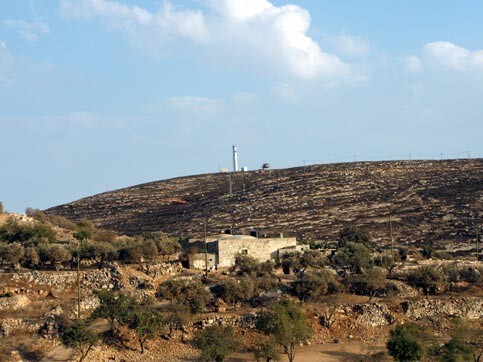
An illegal Israeli settlement outpost tower stands out in the otherwise pastoral landscape
The ugly colonial outposts remind us visitors that these traditional farmers are not exempt from the perils of contemporary politics. Of course, the villagers of Yanoun need no physical markers in the landscape to be recall the hostility of the colonialist settlers, religious extremists who believe the members of their religion alone have the right to the land, and will resort to violence in order to obtain it. The villagers of Yanoun themselves bear the scars of attacks by the fanatical colonialists.
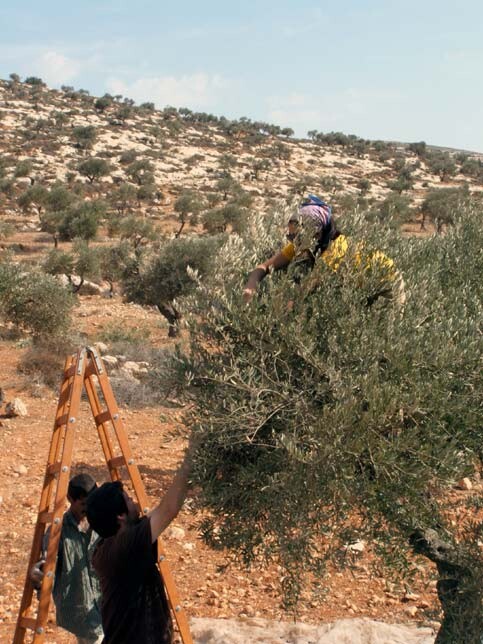
Internationals Gareth and Bina, along with a Palestinian farmer, pick the fruit of an olive tree
And that is why we internationals are here. Because settler aggression towards Palestinian farmers has become so problematic, the Israeli Supreme Court, upon a petition by the Association for Civil Rights in Israel and Rabbis for Human Rights, has ordered that IDF soldiers protect the farmers during the harvest. However, the reservist IDF soldiers are not here all of the time, so when they are, the farmers need all of the hands they can get to pick the fruit before it spoils on the trees.
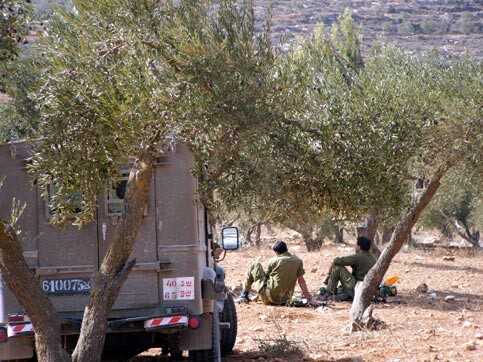
IDF soldiers assigned to protect olive harvesters from settler violence relax under olive trees
The soldiers that stayed with us Saturday were friendly and were getting into the spirit of the harvest, asking the Palestinian harvesters the secret to the delicious and refreshing mint tea they offered to all at the grove. While some of the internationals were skeptical of the reservists’ sincerity, we were all cognizant of the fact that these relaxed soldiers were the same ones who man checkpoints and make life so difficult for the Palestinians. But we also discussed that this is a good assignment for IDF soldiers to have — not only might it help them understand the deep connection Palestinians have to their land, but it is also an opportunity for these young Israelis to get to know Palestinians on a human level in a non-hostile environment, and vice versa. And while these soldiers were chatty and amicable with the Palestinians, the soldiers who were there one day the week before did nothing to stop a settler man from beating up a harvester — and instead of arresting the settler, they detained the Palestinian farmer for two and a half hours.
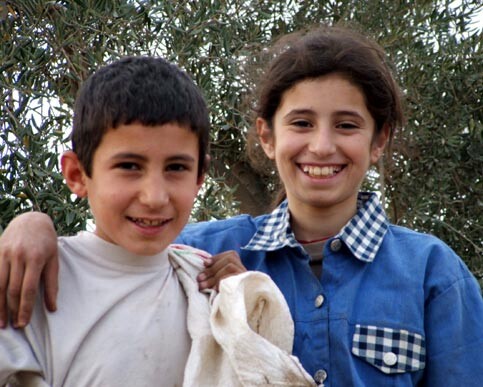
Village boy Murad and his sister Wa’el
But this Saturday the settlers were out of sight and the olive harvest was great fun, though hard work. I had a blast climbing the trees, and enjoyed the feeling of the sun on my skin, and working with the villagers. I particularly recall the huge smile of Wa’el, one of the village children. I let her take a couple of pictures with my camera, and she was very excited. Though she was at first shy and only knows a few phrases of English, she shouted an exuberant, “See you later!” when our group walked back to the village.

Murad’s drawing of an olive tree reflects the landscape and the importance of olive trees to Palestinian culture
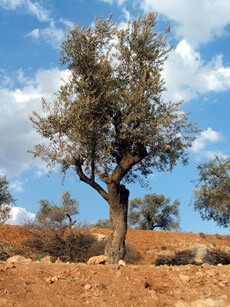
A majestic olive tree stands proudly against the blue sky
I’m not sure how many trees we picked or how many kilos of olives were harvested, but it seemed like a successful day, and everyone was in good spirits. However, I will worry about Yanoun, upon realizing that the settlements, populated by religious extremists who openly espouse their platform of ethnic cleansing, form a ring around Yanoun. If the international house in Yanoun were not there, who knows what would happen to this beautiful little village and its inhabitants.
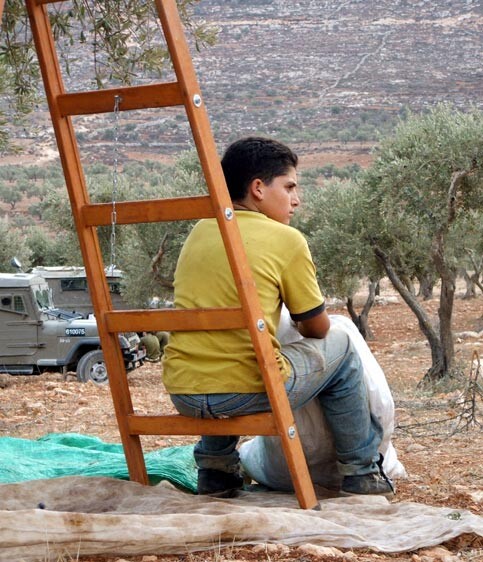
One of the village boys surveys the orchard as he rests on a ladder. IDF jeeps are in the background.
Though the Palestinians insist on staying on their land, despite being shot at by the settlers, having their drinking water wells contaminated by the colonialists’ urine, and losing their livestock and agriculture to these thiefs, a village can only take so much. And because the population of Yanoun is so small, it is easily outnumbered by those living in the nearby Itamar settlement. The conscience of the world cannot let happen to Yanoun what happened to the hundreds of villages that were cleansed of the Palestinian population during the establishment of Israel in 1948.
Maureen Clare Murphy, is Arts, Music, and Culture Editor for The Electronic Intifada and is currently living and working in Ramallah
Related links:



